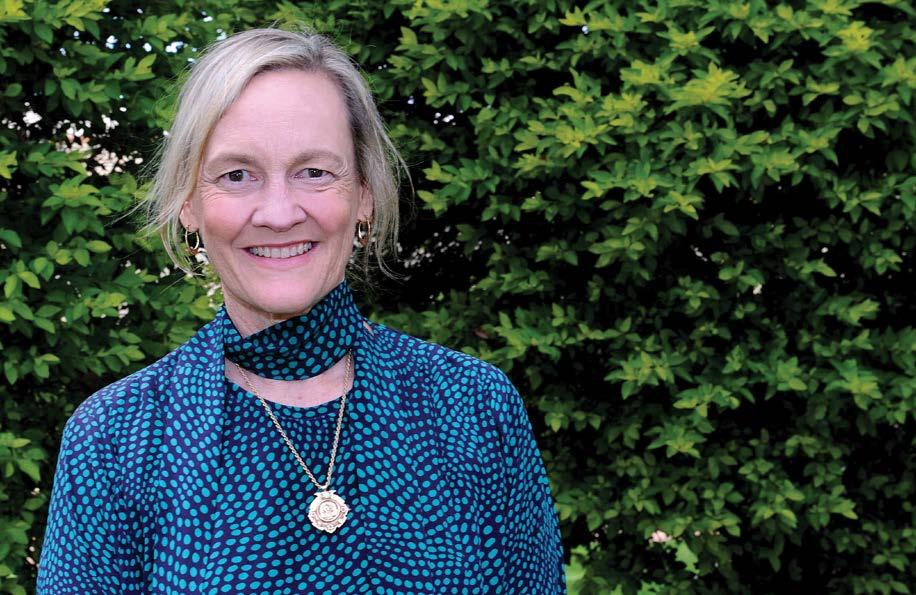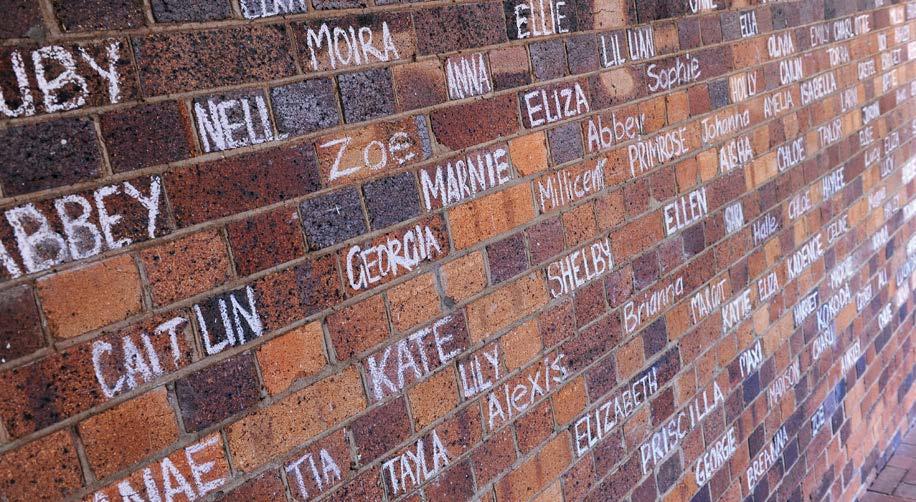
8 minute read
From the Principal
The Space to Choose
DR LINDA EVANS, PRINCIPAL
In speaking of places and spaces in between, Viktor Frankl, holocaust survivor, psychiatrist and Christian, is attributed as saying:
Whether or not Frankl said these precise words, matters little. What matters is that he gained insight through enduring difficulty. His was suffering at its most extreme, yet in its midst, he found hope through what he termed 'the space the choose one's own way'. In the following words, he illustrates this beautifully –
We who lived in concentration camps can remember the men who walked through the huts, comforting others, giving away their last piece of bread. They may have been few in number, but they offer sufficient proof that everything can be taken from a man but one thing: the last of the human freedoms – to choose one’s attitude in any given set of circumstances, to choose one’s own way.
It is easy for us to view 2020 as having been a year of enormous struggle, to talk of it as a disaster, or of the things we missed out on. It was an extraordinary year. We were all held captive in some way by the power of the COVID-19 pandemic. It was difficult for everyone and amid this difficulty; we were called to have perspective. Frankl, as an Auschwitz survivor, gives clear perspective; he also reminds us that we have the freedom to choose [our] attitude in any given set of circumstances; to choose [our] own way. From moment of stimulus to moment of response there is a space for contemplation.
This pandemic entered our collective consciousness in ways we couldn’t have imagined, can’t imagine or haven’t imagined; our global and local responses were and are varied and interesting.
• In Bangalore, India, a restaurant Desi Masala fed more than 10,000 vulnerable people every day. • British Army Captain, the late Tom Moore, aged 100, set out to raise money for the Health Services by walking back and forth in his garden – he raised over $32 million British pounds. • People in Naples, Italy left solidarity baskets for those struggling … 'Put in, if you can, take out, if you can’t.’
More locally at Fairholme – when staff stand-downs appeared imminent – administration staff responded by offering to reduce their working hours to allow others to continue to work, the swim staff became bathroom cleaners just to allow the pool to reopen, and our Day families opened their homes to our Boarders, to enable them to return to face-to-face learning. Even

in our grimmest moments ‘we can hold despair in one hand and hope in the other.’ That was the COVID silver lining, the distillation of what really matters.
We can choose to see silver linings, and we can create them through our choices. Author and Peak Performance Researcher, Dr Adam Fraser, has investigated this space in between stimulus and response – he refers to it in his same-titled book, as The Third Space. His fascination with this began when he worked with soldiers returning from military service in Iraq. Not surprisingly, they brought the stress and trauma of being a soldier into their homes. Fraser observed that they needed significant focus and support within this transition period, within the third space.
Australian Steve Hooker finished 28th in the world in pole vault at the Athens Olympics. Four years later at the Beijing Olympics he won gold. In between time he focused meticulously on getting the small things right in the transition space between defeat and success. Another researcher studied the world’s top tennis players – Nadal, Federer, Serena Williams, for example. He discovered that what separated them from other players were their rituals in the time between points, not in playing the points themselves.
Perhaps this attention to detail, to maintaining the rituals of College life and College culture, was at the heart of the Fairholme response to COVID-19 imposed change. This was evident in the elaborate take-home learning packs devised by Junior School staff; high level of engagement through Schoolbox – the College’s learning management system; the continued Assemblies and Chapel services online; the high participation rates in the COVID Cup Cross Country; ZOOM Smoko meetings with Boarders; House and Holme Group activities and the regularity of personal contact that took priority on a daily basis. For me, the essence of the individuality of care was best evidenced on the day the boarding staff wrote the name of each Boarder in chalk on the brick wall adjacent to Mrs Sutton’s room. Silver linings.
On the day I shared the news that the Year 12 Formal could not go ahead, I had a carpark conversation with Piano Teacher, Mrs Lebsanft, who said: ‘These Year 12 girls are remarkable, there have been unprecedented changes in their lives but they will wear 2020 as a badge of honour into the future.’ And they will. Enduring difficulty provides perspective. For staff and students, 2020 provided a metaphoric badge of honour worth so much more than any certificate or accolade; it is an indelible stamp of resilience and adaptability. Our Senior Leaders of 2020 rewarded us over and over again with their inventiveness and their willingness to do things differently, so apparent in: • Shave for a Cure online • Flourish – the magazine • Their high participation in the COVID Cup Cross Country • They way they led and embraced the opening ceremony at the Athletics Carnival, and • The Senior Common Room mural.
Ultimately, the choices we make in the transitional gap between stimulus and response matters. Despite the disruption of COVID, despite the complexities posed by living with and through a pandemic, there is still choice: choice about our responses. Our Seniors of 2020 have entered their diverse, promise-laden, shiny new worlds; perhaps they can think of Roger Federer who, in the mere seconds in between points in a tennis match, takes the time to plot his response – here he demonstrates the pinnacle use of the third space. We always have the space to choose – as we embrace 2021, may we choose wisely and well.
Frankl reminds us that no matter what, the last of the human freedoms is to choose one’s attitude in any given set of circumstances, and to choose one’s own way.
Key Student Outcomes Student Attendance – Average Rate in the College
In 2020, the average student attendance rate for the whole College was 92%.
Year Level Total Number of Students Number of School Days in 2020 Total Number of Attendance Days in 2020 Total Number of Student Absences Average Attendance Rate
Kindy 2 Day 15 69 909 56 94% Kindy 3 Day 17 101 1,691 161 90% Kindy 4 Day 23 171 3,799 217 94% Prep 18 171 3,078 260 92% 1 19 171 3,249 277 91% 2 23 171 3,799 288 92% 3 21 171 3,545 324 91% 4 29 171 4,825 386 92% 5 34 171 5,592 582 90% 6 36 171 6,068 495 92% 7 106 171 18,215 1446 92% 8 94 171 16,163 1363 92% 9 87 171 14,924 1388 91% 10 91 171 15,473 1185 92% 11 96 171 16,416 1076 93% 12 80 168 13,440 639 95% 92%
APPARENT STUDENT RETENTION, YEAR 10-12 In 2020, the apparent retention rate for students moving from Year 10 through to Year 12 = 100%
Student Retention
Year 10 Base
Year 12 Apparent Retention Number 80 80 100%
Management of Non-Attendance
Fairholme College recognises that attendance each day and each lesson is an integral part of student success. We take great care to monitor the attendance of every student each day. Attendance is recorded electronically each day at 8.30am and again at 11am and in the final class of the day. In addition, rolls are also marked in Assembly/ Chapel or Holme Group Meetings. Absentee lists are generated early each day and are placed on the Staff Room Notice Board and are also emailed to all staff.
Administration staff follow up any students who are absent to ensure that we have had contact from parents or care-givers to let us know of their whereabouts. These staff will phone, email or SMS the parents of any students not accounted for. Additionally, students who are missing from classes during the day are also followed up by academic staff such as a Head of Sub School or a Head of House. These staff are also involved in supporting students to return to school when they have had an extended absence from school.
When a student is ill or unable to attend school, it is expected that parents of Day Girls notify the College by 8.30am by phone, email or via the College app. Boarding staff notify key staff about any Boarders unable to attend class and are therefore in the College Health Centre. Should a student be absent for more than three days, the Head of House or Head of Sub School will contact the family to offer support and enquire as to the student’s welfare at that time. In the case of prolonged absence, parents are asked to request planned absence for their daughter in advance via a letter through the College Principal. Student Absences during examination/ assessment time are managed through the College’s Student Academic Policy. In 2020, when students were working remotely due to COVID restrictions, rolls were maintained when staff facilitated early morning Holme Group check-in sessions. During the day, when staff engaged classes via platforms such as Zoom or Microsoft Teams, attendance was monitored. Follow up with families was similar to established protocols, seeking clarification from parents if a student was not in attendance for remote check in sessions. Using our usual channels, parents were able to notify the College if their daughter was unable to participate in remote learning on a particular day.









